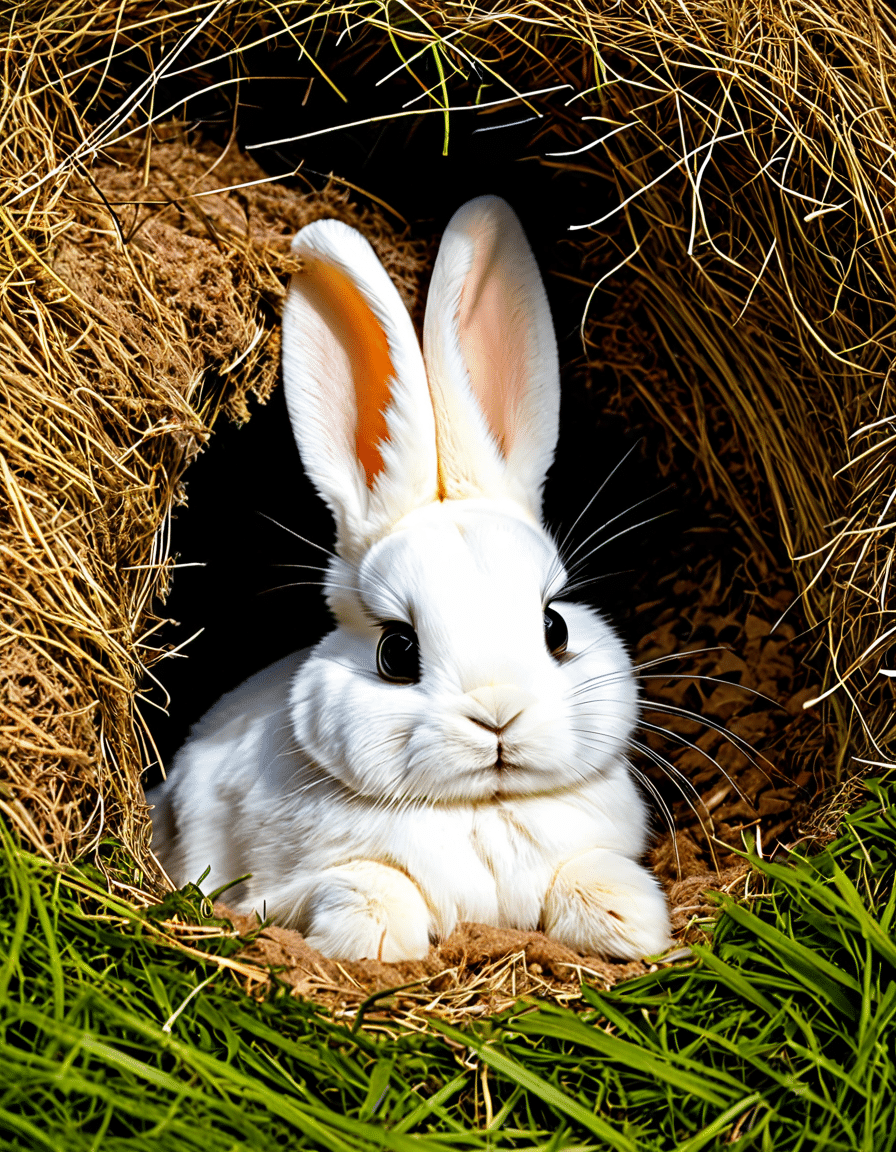Bunnies are fascinating creatures, loved by many for their gentle personalities and playful antics. A common question among rabbit owners is, do bunnies sleep with their eyes open? This intriguing query touches upon their unique sleep patterns and how they interact with their environment. Let’s hop into the world of bunny sleep to discover the truth behind this and other myths.

1. Understanding Rabbit Sleep Patterns: Do Bunnies Sleep With Their Eyes Open?
Unlike many pets, rabbits have a distinct way of resting that often raises curiosity. When you observe your bunny lounging around, you might notice its eyes seem wide open. This doesn’t mean they’re always fully alert. Physiologically, rabbits can rest in a state where their eyes are not entirely closed, allowing them to be aware of potential dangers. In the wild, this instinct acts as a survival mechanism. So, yes, bunnies can indeed sleep with their eyes open!
The Importance of REM Sleep for Rabbits
Like humans and other animals, rabbits need REM (Rapid Eye Movement) sleep, which is crucial for their overall health. Studies have shown that rabbits experience REM sleep, during which their brain activity is heightened. In fact, it’s during this stage that they engage in dreaming, which can be fascinating to consider given what wild scenarios they might visualize – maybe they’d dream of hopping through a lush garden or munching on endless greens.
Rabbits cycle through sleep phases throughout the day, averaging around 8-12 hours of sleep in a 24-hour period. Without sufficient REM sleep, they can become stressed and exhibit unhealthy behaviors. Just as you might notice how stressed kittens can grow quickly and rashly when neglected, bunnies also thrive in calm, restful environments to maintain their well-being.

2. The Top 5 Myths About Bunnies and Their Sleep
It’s easy for myths to swirl around rabbit care and behavior. Let’s debunk the most common misconceptions about bunny sleep to clarify whether do bunnies sleep with their eyes open?
2.1 Myth 1: Bunnies Always Sleep with Their Eyes Open
This myth arises from the misleading notion that rabbits are always alert. While it’s true bunnies can look wide-eyed while resting, they do actually sleep. Their eyes being open is part of their instinctive behavior, letting them stay watchful for predators. Even in rest, they can pick up on movements or sounds around them, allowing for a quick escape if needed.
2.2 Myth 2: Bunnies Are Nocturnal Creatures
Contrary to what some may think, rabbits are primarily crepuscular, meaning they are most active during dawn and dusk. This behavior is rooted in their evolutionary background. Understanding this can be essential for owners when scheduling playtime and meals. Timing their activities to match these active periods will keep bunnies engaged and happy.
2.3 Myth 3: Bunnies Don’t Need Much Sleep
On the contrary, bunnies require a good amount of sleep, typically around 12 hours daily. Without enough rest, they can become irritable and stressed. Think about it: a cranky, sleep-deprived bunny isn’t much different from a cranky toddler! It’s vital to set a peaceful environment in your home, where they can enjoy their much-needed downtime.
2.4 Myth 4: Bunnies Can Sleep Anywhere, Anytime
While rabbits can snooze in various positions, they thrive in safe, comfortable spaces. Make sure your bunny has a cozy spot that feels secure, unlike guinea pigs who might require different nesting setups. A well-designed space helps them feel at ease, which can promote better sleep quality.
2.5 Myth 5: Bunnies Sleep with Their Eyes Closed Only
The fact that rabbits can often sleep with their eyes open intertwines with their evolutionary adaptations. In nature, closing their eyes might mean missing a threat. Therefore, while rabbits might seem to sleep with their eyes open, they may actually be in a relaxed state rather than deep sleep. Their ability to remain partially alert isn’t just a habit—it’s a survival tactic.
3. Can Bunnies See in the Dark? The Role of Light Perception
Let’s transition from sleep to what’s going on in those curious bunny eyes. A common question among pet owners is, can bunnies see in the dark? The short answer is yes, but let’s delve deeper.
The Unique Structure of Rabbit Eyes
Bunny eyes have a special structure that helps them adapt to their environment. They possess a wide field of vision—nearly 360 degrees! This adaptation allows them to spot potential dangers quickly. Their eyes also have a higher number of rod cells, which helps them see well in lower light conditions.
Rabbits can’t see in complete darkness, but they excel in twilight conditions—this is when they’re most active. Understanding these capabilities can aid owners in creating spaces that cater to their pets’ natural instincts.
Nighttime Behavior and Safety
Understanding that bunnies are more perceptive in low-light situations can influence how you set up your home. To accommodate their natural tendencies, consider dimming lights during evening hours. Providing secure hiding spots where they feel safe allows for a more fulfilling nighttime environment.
4. Do Guinea Pigs Sleep With Their Eyes Open? A Comparative View on Sleep in Small Animals
Switching gears, let’s look at sleeping habits across different small animals. Do guinea pigs sleep with their eyes open? You might find it interesting how their sleep behaviors compare to rabbits.
Differences in Sleep Patterns
Guinea pigs, unlike rabbits, tend to sleep with their eyes closed most of the time. They often curl up in cozy spots, contrasting with the alert resting posture commonly seen in bunnies. This difference stems from their unique evolutionary backgrounds, which inform their sleep needs and safety requirements.
Moreover, bunnies need more structured environments where they can safely express their behaviors. While guinea pigs seek more cozy spaces to melt into, bunnies thrive with room to move and explore, showcasing how varied pet care can be across species.
5. Innovative Tips for Enhancing Bunny Sleep Quality
Now that we’ve debunked myths, let’s provide actionable tips to optimize your bunny’s sleep environment. A few thoughtful adjustments can significantly improve their rest.
Innovative Wrap-Up: Sleeping Smart with Your Bunny
As we unravel the truths behind bunny sleep, it becomes clear that understanding their behaviors and needs is paramount. By creating a restful environment and respecting their natural instincts, owners can foster happy and healthy bunnies. Knowledge and dedication are key to nurturing these gentle creatures and enhancing the bond we share with them. Whether you’re a seasoned rabbit owner or new to the game, every bit of insight helps build a better life for your furry friends. Engaging with your pet’s needs can make all the difference, ensuring they’re living their best bunny lives!
Do Bunnies Sleep With Their Eyes Open: Myths and Truths
Bunnies are fascinating creatures, and there’s a lot of chatter about whether they sleep with their eyes open. Spoiler alert: they don’t, but there’s more to this story! One fun fact is that rabbits can actually doze off while remaining alert to their surroundings. This allows them to detect potential dangers easily. Talk about being a multi-tasker! Unlike many pets, a bunny’s unique eye structure allows them to blink less often than we do. While this might seem weird, it’s perfectly normal in the animal kingdom—just like how smooth-tailed geckos are active during the day, adapting their habits for survival.
Now, let’s dig a bit deeper! Bunnies usually enter a deep sleep phase where they may lie down with their eyes closed. It’s during these moments that they look their most adorable—think grey French bulldog puppy dreams. However, if a rabbit feels threatened, they’ll easily wake up and scamper away. So, if you ever see your bunny lounging with those peepers still open, don’t fret; it’s merely being cautious.
In addition, did you know that bunnies often sleep in short bursts rather than lengthy sessions? This means they’re constantly on the lookout for danger. This instinctual behavior is akin to how red slider turtles choose specific environments that suit their needs. It’s nature’s way of keeping them safe! Next time you see your furry friend at rest, remember they’ve got an impressive survival instinct guiding them, similar to how many look for top-rated veterinarians near me to ensure their pet’s health is in good hands.



